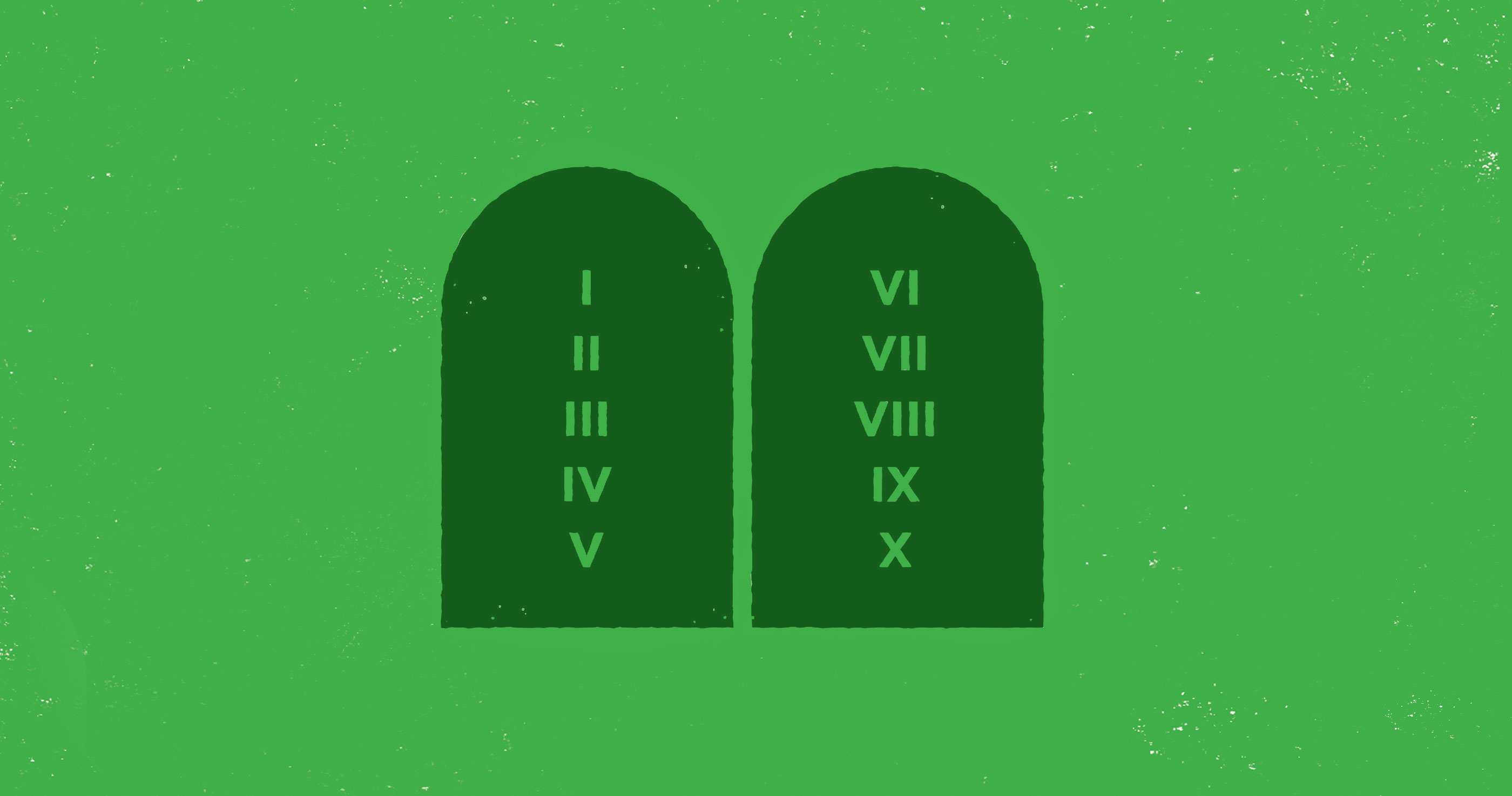Previous Lessons: 1, 2, 3, 4, 5, 6, 7, 8, 9, 10, 11
Exodus 20:17
“You shall not covet your neighbor’s house; you shall not covet your neighbor’s wife, or his male servant, or his female servant, or his ox, or his donkey, or anything that is your neighbor’s.”
Ephesians 5:3,5
But sexual immorality and all impurity or covetousness must not even be named among you, as is proper among saints…5 For you may be sure of this, that everyone who is sexually immoral or impure, or who is covetous (that is, an idolater), has no inheritance in the kingdom of Christ and God.
James 4:1-3
What causes quarrels and what causes fights among you? Is it not this, that your passions are at war within you? 2 You desire and do not have, so you murder. You covet and cannot obtain, so you fight and quarrel. You do not have, because you do not ask. 3 You ask and do not receive, because you ask wrongly, to spend it on your passions.
Luke 12:13-21
Someone in the crowd said to [Jesus], “Teacher, tell my brother to divide the inheritance with me.” 14 But he said to him, “Man, who made me a judge or arbitrator over you?” 15 And he said to them, “Take care, and be on your guard against all covetousness, for one’s life does not consist in the abundance of his possessions.” 16 And he told them a parable, saying, “The land of a rich man produced plentifully, 17 and he thought to himself, ‘What shall I do, for I have nowhere to store my crops?’ 18 And he said, ‘I will do this: I will tear down my barns and build larger ones, and there I will store all my grain and my goods.19 And I will say to my soul, “Soul, you have ample goods laid up for many years; relax, eat, drink, be merry.”’ 20 But God said to him, ‘Fool! This night your soul is required of you, and the things you have prepared, whose will they be?’ 21 So is the one who lays up treasure for himself and is not rich toward God.”
Hebrews 13:5
Keep your life free from love of money, and be content with what you have, for he has said, “I will never leave you nor forsake you.”
Colossians 3:5, 12-15
Put to death therefore what is earthly in you: sexual immorality, impurity, passion, evil desire, and covetousness, which is idolatry.
Put on then, as God’s chosen ones, holy and beloved, compassionate hearts, kindness, humility, meekness, and patience, 13 bearing with one another and, if one has a complaint against another, forgiving each other; as the Lord has forgiven you, so you also must forgive. 14 And above all these put on love, which binds everything together in perfect harmony. 15 And let the peace of Christ rule in your hearts, to which indeed you were called in one body. And be thankful.
1 Timothy 6:6-11
But godliness with contentment is great gain, 7 for we brought nothing into the world, and we cannot take anything out of the world. 8 But if we have food and clothing, with these we will be content. 9 But those who desire to be rich fall into temptation, into a snare, into many senseless and harmful desires that plunge people into ruin and destruction. 10 For the love of money is a root of all kinds of evils. It is through this craving that some have wandered away from the faith and pierced themselves with many pangs. 11 But as for you, O man of God, flee these things. Pursue righteousness, godliness, faith, love, steadfastness, gentleness.
The Holy Bible, English Standard Version. ESV® Permanent Text Edition® (2016). Copyright © 2001 by Crossway Bibles, a publishing ministry of Good News Publishers.
Questions to Consider:
1. Read through all of today’s passages. What does it mean to covet? How are coveting, jealousy, and greed related? Compare the tenth Commandment to the other nine. In what way is the sin of coveting different from the sins in the other Commandments? Is coveting observable? What specific things does the tenth Commandment tell us not to covet (Exodus 20:17)?
2. How is coveting at the root of murder, theft, adultery, and lying? The Ephesians and Colossians passages say that coveting is idolatry. Why? Can you think of any other sins coveting could lead to? How could recognizing coveting and putting it to death help prevent it from snowballing into more sin?
3. Think about coveting, a secret sin of the heart, in the immediate context of the tenth Commandment (God is setting apart Israel as His own special people and establishing them as a nation). How would obedience to this Commandment have been conducive to keeping law and order in civil society?
4. Do you think the nations surrounding Israel who worshiped pagan gods had laws against coveting? Why or why not? If any of them did, what would be the difference between a false god making and enforcing a law against a secret sin of the heart and God making and enforcing such a law? How would a law against a secret sin have pointed Israel’s pagan neighbors to the one true God who sees and judges the hidden secrets of the heart? How would this have been a testimony to God’s power and omniscience?
5. According to the Ephesians and James passages, is coveting characteristic of Christians or lost people? What does James say are some of the results of coveting? How might having a covetous heart affect our prayer life? (James 4:3) What does Ephesians 5:5 say is the consequence of unrepentant coveting?
6. What role did coveting play in the parable Jesus told in the Luke passage? Explain Luke 12:15 in your own words.
7. Examine the Hebrews, Colossians and 1 Timothy passages and compare them with the tenth Commandment in Exodus 20:17. Is the Old Testament instruction about coveting singular (one part) or binary (two parts)? The New Testament instruction? What are the “thou shalt not” and the “thou shalt” instructions about coveting in these New Testament passages? Instead of coveting, we are to be c_____. (Hebrews 13:5) Why, according to Hebrews 13:5, are Christians to be content? How does it demonstrate to others that Christ is sufficient when we are content instead of covetous? Read Colossians 3:15. How can thankfulness counteract coveting?
Homework:
When we covet, we are essentially saying to God, “What You have so lovingly and graciously provided for me isn’t good enough. I deserve better.” Coveting brings with it the sin of ingratitude toward God. Spend some time in prayer asking God to bring to mind any areas of your life in which you’re coveting, and ask Him to forgive you.
Make a list of the things, people, and life circumstances God has blessed you with and keep it handy (maybe in your notes app in your phone?). This week if you find yourself coveting something, someone, or a certain circumstance, drop what you’re doing, go back to that list and offer a prayer of thanksgiving to God for what He has already provided for you. Ask Him to make your heart content.

 “I’m not sad that I’m not and couldn’t be a church planter or lead pastor. I don’t feel restricted or resentful. Instead, I feel full.” I always appreciate the voices of sisters in Christ who are leading unashamedly under the banner of strong, biblical complementarianism. Complementarianism is a blessing, not a burden, so I really enjoyed Whitney Woollard’s* article Delighting in Authority: How to Create a Culture of Happy Complementarians over at Eternal Perspectives Ministry.
“I’m not sad that I’m not and couldn’t be a church planter or lead pastor. I don’t feel restricted or resentful. Instead, I feel full.” I always appreciate the voices of sisters in Christ who are leading unashamedly under the banner of strong, biblical complementarianism. Complementarianism is a blessing, not a burden, so I really enjoyed Whitney Woollard’s* article Delighting in Authority: How to Create a Culture of Happy Complementarians over at Eternal Perspectives Ministry. “…since loving Christ entails loving the Church; it’s time for you now to heed the summons of God’s Word and go back into a local church, a local expression of the Body of Christ.” I really appreciate Jennifer Brogdon’s* gentle and compassionate approach to encouraging wounded saints to go back to church (especially compared to my usual “bull in a china shop” treatment of the same topic) in her article Go Back to the Local Church.
“…since loving Christ entails loving the Church; it’s time for you now to heed the summons of God’s Word and go back into a local church, a local expression of the Body of Christ.” I really appreciate Jennifer Brogdon’s* gentle and compassionate approach to encouraging wounded saints to go back to church (especially compared to my usual “bull in a china shop” treatment of the same topic) in her article Go Back to the Local Church.



